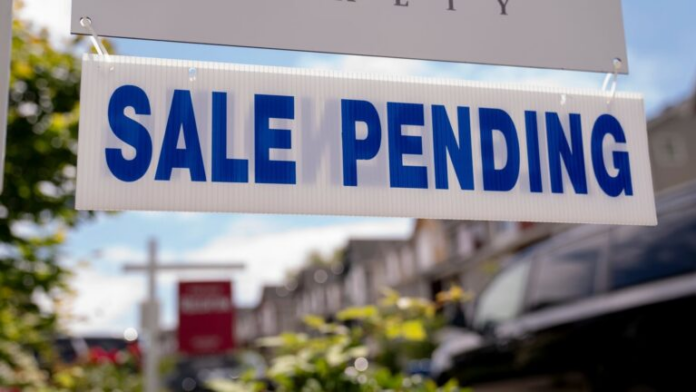Home Buying The upcoming housing battle that could roil mortgage costs even more The new administration is widely expected to resume a push to remove Fannie Mae and Freddie Mac from government control. A for-sale sign outside a home in Seattle. Fannie Mae and Freddie Mac buy up huge quantities of loans and package them as securities. David Ryder
A big change to housing policy that many experts anticipate from the new Trump administration could roil the mortgage market and throw an already unsettled real estate industry into more turmoil.
The new administration is widely expected to resume a push to remove Fannie Mae and Freddie Mac, the two national mortgage behemoths that buy up huge quantities of loans, from government control. That initiative was a priority during President-elect Donald Trump’s first term, but the pandemic thwarted those plans. Now, though, economists and housing experts say the government has to be especially careful not to reshuffle the companies in a way that raises uncertainty or spooks investors, with mortgage rates already high and affordability at a crisis point.
Advertisement:
“It’s really a question, not so much of ‘whether,’ but ‘how’” the change gets made, said Michael Fratantoni, chief economist at the Mortgage Bankers Association.
The mortgage market is already behaving in unexpected ways. After the 30-year fixed rate peaked around 8 percent last fall, it eased as the Federal Reserve began lowering interest rates. But now mortgage costs are again ticking up despite more Fed cuts, driven by a strong economy and the ongoing reality that there aren’t enough homes to go around.
The firms are deeply embedded in the workings of housing finance in America, and the popular 30-year fixed rate mortgage simply wouldn’t exist without them. Fannie and Freddie don’t make mortgage loans directly, but rather buy and package them into securities. Together, the companies guarantee about half of existing home loans.
Advertisement:
During the mortgage-market meltdown of 2008, the George W. Bush administration effectively nationalized the companies in an effort to stabilize financial markets and keep mortgage credit flowing. Ever since, Fannie and Freddie have existed in a kind of legal and financial purgatory known as “conservatorship” overseen by the Federal Housing Finance Agency (FHFA). The securities they sell to investors are considered safe on Wall Street, since the companies are entitled to massive government support if needed under the terms of their federal bailout agreements.
The arrangement brokered more than 15 years ago was never meant to be permanent. But while some economists and policymakers have since taken a “don’t fix what’s not broken” approach, Trump’s advisers are widely expected to try to finish what they started before the pandemic hit. Many conservatives believe that the government shouldn’t directly control such large businesses and that companies like Fannie and Freddie need buffers against the political agendas of a sitting White House.
During Trump’s first term, a driving force to overhaul Fannie and Freddie was Mark Calabria, then the head of the FHFA and now believed to be a potential member in the new administration. In an interview with The Washington Post, Calabria said he still believes in privatizing the companies and that mortgage rates would not rise if the process is done in a way that leaves investors assured that mortgage-backed securities are still risk-free. (Calabria said any personnel decisions were up to the president-elect.)
Advertisement:
“Fannie and Freddie are, under law, expected to be fixed,” Calabria said. “It’s better to do this in a calm environment than to try to fix something in the middle of a crisis.”
Ending Fannie and Freddie’s conservatorship could work in a few ways. Congress could pass a law overhauling the entire mortgage-finance system and grant an explicit guarantee on securities issued by Fannie, Freddie, or future competitors. But that kind of involvement from Capitol Hill is highly unlikely after repeated efforts failed to gain much traction.
Another, more likely option: The Trump administration sidesteps Congress. Under one scenario, the Treasury Department and the FHFA agree to release the companies after they continue to retain their earnings for another year or two. In exchange, they would have to agree to pay taxpayers an ongoing fee for the government’s backstop, which is necessary for their business model. Any option that includes no such backstop would cause markets to go haywire.
Trump has many financial priorities, and revamping Fannie and Freddie wasn’t a stated goal of his campaign. But shares of both companies have been on an upward tear since Election Day, a telling barometer of how much the markets expect the companies will be released.
Advertisement:
Still, others within the mortgage industry fear an abrupt change to the market —including an elimination or paring back of the government backstop — would push mortgages up. That’s because investors who buy Fannie and Freddie’s mortgage-backed securities could demand higher interest rates, especially if there is no explicit government backstop for the mortgage bonds. Mark Zandi, chief economist of Moody’s Analytics who also advised the Kamala Harris campaign, said such a move would leave the 30-year fixed rate mortgage “diminished.”
“Whatever scenario you pick, it’s just worse than the status quo,” Zandi said.



